
Gracillariidae is an important family of insects in the order Lepidoptera and the principal family of leaf miners that includes several economic, horticultural or recently invasive pest species such as the horse-chestnut leaf miner, Cameraria ohridella.
Phyllonorycter connexella is a moth of the family Gracillariidae. It is found from Fennoscandia to the Pyrenees and Italy and from France to central Russia and Ukraine.

Phyllonorycter pastorella is a moth of the family Gracillariidae. It is known from all of Europe, east to Russia, China and Japan.
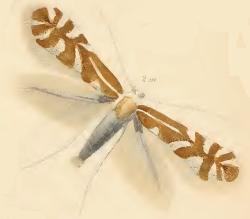
Phyllonorycter salicicolella is a moth of the family Gracillariidae. It is known from all of Europe, east to Russia and Japan.
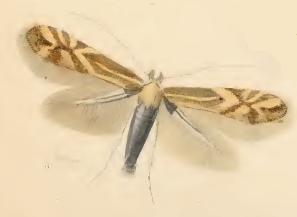
Phyllonorycter salictella is a moth of the family Gracillariidae. It is known from all of Europe, east to Russia and Japan.
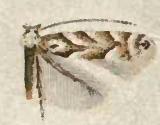
Phyllonorycter salicifoliella is a moth of the family Gracillariidae. It is widespread across North America, from Mississippi to Ontario in the east and from southern California to northern British Columbia in the west.

Phyllonorycter scudderella is a moth of the family Gracillariidae. It is widespread in eastern North America from Ontario to Ohio and in western North America from south-eastern Alaska to Oregon.
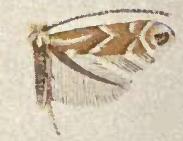
Phyllonorycter apicinigrella is a moth of the family Gracillariidae. It is found along the western coast of the United States from San Luis Obispo County, California, north to Whatcom County in extreme north-western Washington.
Phyllonorycter pruinosella is a moth of the family Gracillariidae. It is known from Bengal and Bombay in what is now India and Bangladesh.
Phyllocnistis ramulicola is a moth of the family Gracillariidae. It is known from southern Great Britain and Portugal.

Phyllocnistis saligna is a moth of the family Gracillariidae. It is known from almost all Europe, as well as India, Sri Lanka, La Réunion and South Africa.

Phyllocnistis valentinensis is a moth of the family Gracillariidae. It is known from Spain, Greece and Bulgaria.

Marmara salictella is a moth of the family Gracillariidae. It is known from Québec in Canada and Connecticut, Maine, Vermont, Virginia, California and the Atlantic states of the United States.

Callisto coffeella is a moth of the family Gracillariidae found in Europe. It was first described by Johan Wilhelm Zetterstedt in 1839.
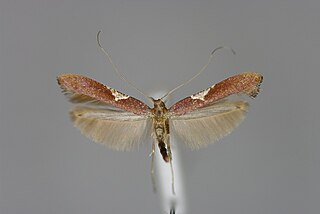
Caloptilia stigmatella is a moth of the family Gracillariidae. It is known from the Holarctic Region, including all of Europe.
Ornixola caudulatella is a moth of the family Gracillariidae. It is known from France, Italy, Germany, Austria, Poland, Hungary, Slovakia, the Czech Republic, Romania, Greece, Lithuania, Latvia, Estonia, Russia and Ukraine.
Caloptilia chrysolampra is a moth of the family Gracillariidae. It is known from China, Japan, Korea and Taiwan.
Cameraria saliciphaga is a moth of the family Gracillariidae. It is known from Tajikistan, Turkmenistan and Uzbekistan.

Micrurapteryx salicifoliella is a moth of the family Gracillariidae. It is known from Canada and the United States.

Callisto basistrigella is a moth of the family Gracillariidae. It is found in the south-eastern Alps, ranging from the Dolomites (Italy) in the west to the Julian Alps (Slovenia) in the east and the Carnic Alps and Lienzer Dolomiten (Austria) in the north. The habitats are related to the dwarf-shrub zone and include subalpine meadows, rock formations and scree with Salix-bushes and shrubs. The species is restricted to limestone with an altitudinal range from about 1,200 to 2,300 meters.









